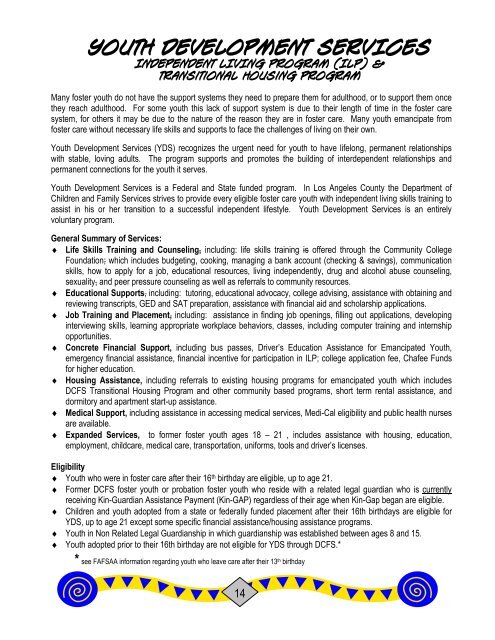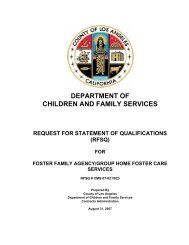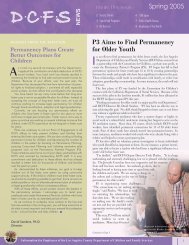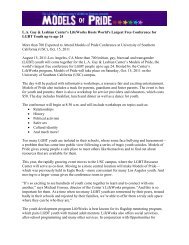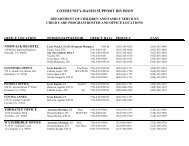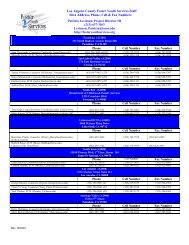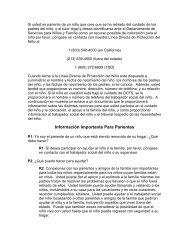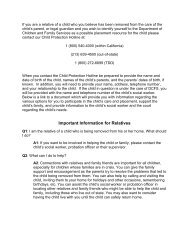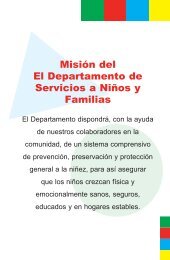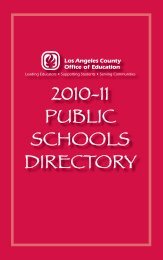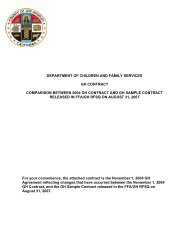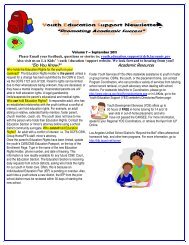Permanency Guide - Los Angeles County Department of Children ...
Permanency Guide - Los Angeles County Department of Children ...
Permanency Guide - Los Angeles County Department of Children ...
You also want an ePaper? Increase the reach of your titles
YUMPU automatically turns print PDFs into web optimized ePapers that Google loves.
YOUTH DEVELOPMENT SERVICES<br />
INDEPENDENT LIVING PROGRAM (ILP) &<br />
Transitional Housing Program<br />
Many foster youth do not have the support systems they need to prepare them for adulthood, or to support them once<br />
they reach adulthood. For some youth this lack <strong>of</strong> support system is due to their length <strong>of</strong> time in the foster care<br />
system, for others it may be due to the nature <strong>of</strong> the reason they are in foster care. Many youth emancipate from<br />
foster care without necessary life skills and supports to face the challenges <strong>of</strong> living on their own.<br />
Youth Development Services (YDS) recognizes the urgent need for youth to have lifelong, permanent relationships<br />
with stable, loving adults. The program supports and promotes the building <strong>of</strong> interdependent relationships and<br />
permanent connections for the youth it serves.<br />
Youth Development Services is a Federal and State funded program. In <strong>Los</strong> <strong>Angeles</strong> <strong>County</strong> the <strong>Department</strong> <strong>of</strong><br />
<strong>Children</strong> and Family Services strives to provide every eligible foster care youth with independent living skills training to<br />
assist in his or her transition to a successful independent lifestyle. Youth Development Services is an entirely<br />
voluntary program.<br />
General Summary <strong>of</strong> Services:<br />
♦ Life Skills Training and Counseling, including: life skills training is <strong>of</strong>fered through the Community College<br />
Foundation; which includes budgeting, cooking, managing a bank account (checking & savings), communication<br />
skills, how to apply for a job, educational resources, living independently, drug and alcohol abuse counseling,<br />
sexuality, and peer pressure counseling as well as referrals to community resources.<br />
♦ Educational Supports, including: tutoring, educational advocacy, college advising, assistance with obtaining and<br />
reviewing transcripts, GED and SAT preparation, assistance with financial aid and scholarship applications.<br />
♦ Job Training and Placement, including: assistance in finding job openings, filling out applications, developing<br />
interviewing skills, learning appropriate workplace behaviors, classes, including computer training and internship<br />
opportunities.<br />
♦ Concrete Financial Support, including bus passes, Driver’s Education Assistance for Emancipated Youth,<br />
emergency financial assistance, financial incentive for participation in ILP; college application fee, Chafee Funds<br />
for higher education.<br />
♦ Housing Assistance, including referrals to existing housing programs for emancipated youth which includes<br />
DCFS Transitional Housing Program and other community based programs, short term rental assistance, and<br />
dormitory and apartment start-up assistance.<br />
♦ Medical Support, including assistance in accessing medical services, Medi-Cal eligibility and public health nurses<br />
are available.<br />
♦ Expanded Services, to former foster youth ages 18 – 21 , includes assistance with housing, education,<br />
employment, childcare, medical care, transportation, uniforms, tools and driver’s licenses.<br />
Eligibility<br />
♦ Youth who were in foster care after their 16 th birthday are eligible, up to age 21.<br />
♦ Former DCFS foster youth or probation foster youth who reside with a related legal guardian who is currently<br />
receiving Kin-Guardian Assistance Payment (Kin-GAP) regardless <strong>of</strong> their age when Kin-Gap began are eligible.<br />
♦ <strong>Children</strong> and youth adopted from a state or federally funded placement after their 16th birthdays are eligible for<br />
YDS, up to age 21 except some specific financial assistance/housing assistance programs.<br />
♦ Youth in Non Related Legal Guardianship in which guardianship was established between ages 8 and 15.<br />
♦ Youth adopted prior to their 16th birthday are not eligible for YDS through DCFS.*<br />
* see FAFSAA information regarding youth who leave care after their 13 th birthday<br />
14


